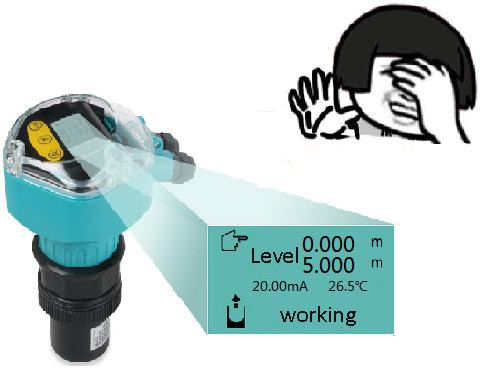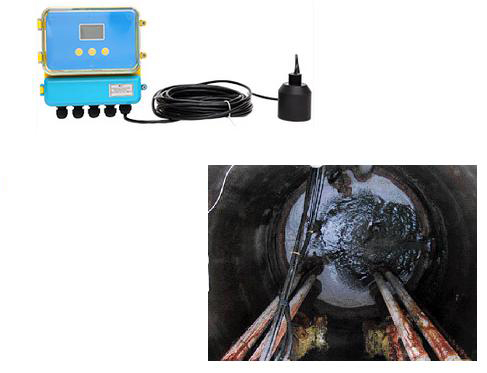

Ultrasonic level gauges must be very familiar to everyone. Because of the non-contact measurement, they can be widely used to measure the height of various liquids and solid materials. Today, the editor will introduce to all of you that ultrasonic level gauges often fail and solve tips.
The first type: enter the blind zone
Trouble phenomenon: full scale or arbitrary data appears.

Cause of failure: Ultrasonic level gauges have blind areas, generally within 5 meters of range, and the blind area is 0.3-0.4 meters. The range within 10 meters is 0.4-0.5 meters. After entering the blind zone, the ultrasound will show arbitrary values and cannot work normally.
Solution tips: When installing, consider the height of the blind zone. After installation, the distance between the probe and the highest water level must be greater than the blind zone.
The second type: there is stirring in the on-site container, and the liquid fluctuates greatly, which affects the measurement of the ultrasonic level gauge.

Trouble phenomenon: No signal or severe data fluctuation.
The cause of the failure: The ultrasonic level gauge said to measure the distance of a few meters, it all refers to the calm water surface. For example, an ultrasonic level gauge with a range of 5 meters generally means that the maximum distance to measure a calm water surface is 5 meters, but the actual factory will achieve 6 meters. In the case of stirring in the container, the water surface is not calm, and the reflected signal will be reduced to less than half of the normal signal.
Solution tips: Choose a larger range ultrasonic level gauge, if the actual range is 5 meters, then use a 10m or 15m ultrasonic level gauge to measure. If you don’t change the ultrasonic level gauge and the liquid in the tank is non-viscous, you can also install a stilling wave tube. Put the ultrasonic level gauge probe in the stilling wave tube to measure the height of the level gauge, because the liquid level in the stilling wave tube is basically stable. . It is recommended to change the two-wire ultrasonic level gauge to a four-wire system.
The third type: foam on the surface of the liquid.
Trouble phenomenon: The ultrasonic level gauge keeps searching, or displays the “lost wave” status.
The cause of the failure: the foam will obviously absorb the ultrasonic wave, which causes the echo signal to be very weak. Therefore, when more than 40-50% of the liquid surface is covered with foam, most of the signal emitted by the ultrasonic level gauge will be absorbed, causing the level gauge to fail to receive the reflected signal. This has nothing to do with the thickness of the foam, it is mainly related to the area covered by the foam.
Solution tips: install still wave tube, put the ultrasonic level gauge probe in the still wave tube to measure the height of the level gauge, because the foam in the still wave tube will be reduced a lot. Or replace it with a radar level gauge for measurement. The radar level gauge can penetrate bubbles within 5 cm.
Fourth: There is electromagnetic interference on site.

Trouble phenomenon: The data of the ultrasonic level gauge fluctuates irregularly, or simply shows no signal.
Reason: There are many motors, frequency converters and electric welding in the industrial field, which will affect the measurement of ultrasonic level gauge. Electromagnetic interference can exceed the echo signal received by the probe.
Solution: The ultrasonic level gauge must be grounded reliably. After grounding, some interference on the circuit board will run away through the ground wire. And this ground is to be grounded separately, it cannot share the same ground with other equipment. The power supply cannot be the same power supply as the frequency converter and the motor, and it cannot be directly drawn from the power supply of the power system. The installation site should be far away from frequency converters, variable frequency motors, and high-power electric equipment. If it cannot be far away, a metal instrument box must be installed outside the level gauge to isolate and shield it, and this instrument box must also be grounded.
Fifth: The high temperature in the on-site pool or tank affects the measurement of the ultrasonic level gauge.
Trouble phenomenon: It can be measured when the water surface is close to the probe, but cannot be measured when the water surface is far away from the probe. When the water temperature is low, the ultrasonic level gauge measures normally, but the ultrasonic level gauge cannot measure when the water temperature is high.
The cause of the failure: the liquid medium generally does not produce steam or mist when the temperature is below 30-40℃. When the temperature exceeds this temperature, it is easy to produce steam or mist. The ultrasonic wave emitted by the ultrasonic level gauge will attenuate once through the steam during the transmission process and reflect from the liquid surface. When it comes back, it has to be attenuated again, causing the ultrasonic signal to return to the probe to be very weak, so it cannot be measured. Moreover, in this environment, the ultrasonic level gauge probe is prone to water droplets, which will hinder the transmission and reception of ultrasonic waves.
Solution tips: To increase the range, the actual tank height is 3 meters, and an ultrasonic level gauge of 6-9 meters should be selected. It can reduce or weaken the influence of steam or mist on the measurement. The probe should be made of polytetrafluoroethylene or PVDF and made into a physically sealed type, so that water droplets are not easy to condense on the emitting surface of such a probe. On the emitting surface of other materials, water droplets are easier to condense.
The above reasons may cause the abnormal operation of the ultrasonic level gauge, so when purchasing the ultrasonic level gauge, be sure to tell the on-site working conditions and experienced customer service, such as Xiaobian me, haha.
Post time: Dec-15-2021




